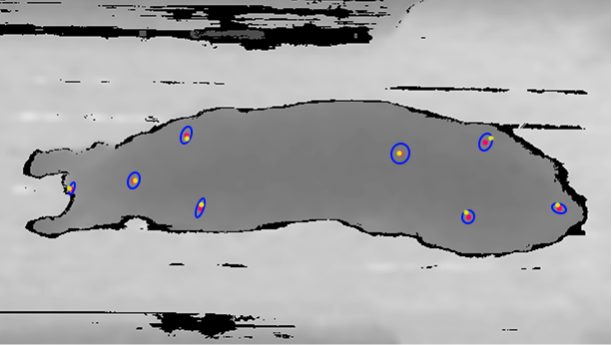Morris utilizes Smart Agriculture to improve quality of life across the industry
BAE associate professor, Daniel Morris, PhD, uses Smart Agriculture to improve quality of life in the animal agriculture industry as well as improving crop production

 Published: January 18, 2023
Published: January 18, 2023
Daniel Morris, Ph.D., is an associate professor in the Biosystems and Agricultural Engineering Department (BAE) with a joint appointment in the Electrical and Computer Engineering Department (ECE). Morris's lab, the 3D Vision Lab, has been exploring using Smart Agriculture to improve the quality of life across agriculture. Staffing has proved to be challenging for many producers in the agricultural industry, and turnover is high. At the same time, limited animal monitoring results in many preventable animal deaths, which is bad for animal welfare and producer income. Morris has set out to provide solutions to improve the welfare of the animals and increase production for the farmers.
 Morris's vision is to use automated monitoring of individual animals to guide animal-specific care. A team consisting of Steven Yik, Madonna Benjamin, Michael Lavagnino and Daniel Morris developed a novel sensor system that is mounted on farms and monitors female swine. A depth sensor and a deep learning algorithm automatically estimate and track pig posture. Ongoing work will turn these tracks into informative health measures, such as body condition and lameness, that producers can use to proactively treat injured swine rather than cull them. The MSU Innovation Center awarded the team the 2022 Innovation of the Year.
Morris's vision is to use automated monitoring of individual animals to guide animal-specific care. A team consisting of Steven Yik, Madonna Benjamin, Michael Lavagnino and Daniel Morris developed a novel sensor system that is mounted on farms and monitors female swine. A depth sensor and a deep learning algorithm automatically estimate and track pig posture. Ongoing work will turn these tracks into informative health measures, such as body condition and lameness, that producers can use to proactively treat injured swine rather than cull them. The MSU Innovation Center awarded the team the 2022 Innovation of the Year.
Morris predicts, With this project, and others being developed by academia and industry, animal farming is on the cusp of a new technology wave that will see animal lives improved, and farm production raised.
Another goal of Morris's lab is to develop automated crop inspection tools. One use of inspection is for selecting bean varieties to be grown in Michigan that are canned and sold nationwide as an important source of nutrition. Crop inspection is time-consuming and tedious for humans and suffers from subjectivity. Researchers in Morris lab developed an automated inspection technique that assesses bean seed coat quality using just color images of beans.
Morris says, The crop-breeding challenge of our generation is to find plant varieties that can be grown sustainably with improved yields while reducing energy, fertilizer, and pesticide use. Critical to achieving this are tools that automatically quantify crop quality and enable breeders to test more varieties rapidly. Creating these automatic crop inspection tools is a goal of our lab.



 Print
Print Email
Email



